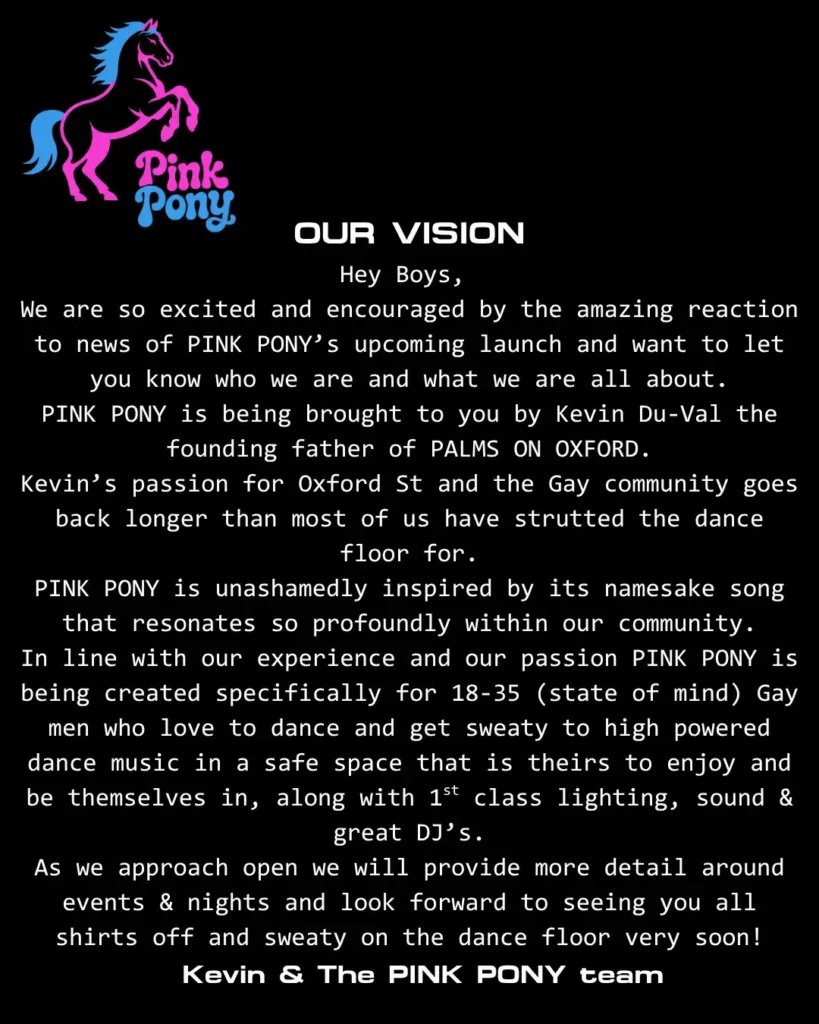When Chappell Roan wrote the seminal queer hit Pink Pony Club, I doubt a sexist and exclusionary nightclub deliberately catering to gay male patrons was what she had in mind.
For those who missed it, a new Sydney-based venue named after Chappell’s gay anthem has been blasted online for “unashamedly” wanting 90 per cent gay men at their club. Correct me if I’m wrong, but it seems as if the owners, Kevin Du-Val and Michael Lewis, have either never listened to a single lyric Chappell has sung, or they have completely missed the point of her work and ethos as an artist.
The club will be “unashamedly be targeted at the boys, pretty much 18 to 35. Of course, the girls will be welcome,” Lewis told Gay Sydney News. “But it would certainly be our desire that it is predominantly gay boys, and when I say predominantly, I’m sort of talking 90 per cent plus.”
They then went on to discuss how best to comply with laws while still upholding their “predominantly male” preference, saying “in terms of how much we can vet the crowd while still complying with the law”. The co-founders of the bar have since told The Guardian that they will be changing the name. “We acknowledge and respect the very passionate feedback from the wider community and it is clear that it’s best to move forward with a different name for the new venue,” Lewis said.

To any queer folk reading this, particularly those who identify as female or gender-diverse, I’m fairly certain this isn’t the first time gay men have gatekept a space they have every right to share. This ties into a broader conversation gaining traction about the difference between being gay and being queer. Simply put, one is a sexual preference and the other is an identity and community.
First, let’s talk about the context behind Pink Pony Club and why this venue using its name feels like a slap in the face to Chappell Roan and queer women everywhere.
Chappell was inspired to write Pink Pony Club after visiting The Abbey in Los Angeles, an iconic queer venue known for self-expression and acceptance. She sings of a lesbian girl in the Midwest dreaming of a place “where boys and girls can all be queens every single day” (take note, real-life Pink Pony Club — she said girls too!). The song explores how she knows her mum will be disappointed, but she must be her full queer self.
Chappell has performed the song countless times, including on Saturday Night Live just before the most recent US presidential election, the same episode featuring Kamala Harris. Many at SNL said it was the loudest audience they’d ever heard. It’s the kind of song queer people feel in their bones. No wonder Rolling Stone ranked it 23rd on their list of the greatest songs of the 21st century. It’s queer liberation and joy at its finest.
The irony that a venue wanting to limit the number of women inside is named after one of the most famous lesbians of our time is not lost on me. The jokes write themselves.
As a proud asexual woman who has centred much of her career on asexual advocacy, this Pink Pony Club incident feels fairly typical given the number of unpleasant interactions I’ve had with gay men. And I know I’m not alone. Every corner of the queer community has experienced this at some point. Bisexual people have been told they’re “attention-seeking” or need to “choose”. Gay men have turned their backs on trans people. Lesbians have been the butt of jokes made by gay men despite being among their biggest supporters during times of need. Asexuals like me are told we “don’t belong” or that our identity “isn’t real”. Gay men have long been gatekeepers of the queer community, because at the end of the day, while they may be gay, they are still men.
At a time when queer spaces are being shut down, anti-trans hate is rising, and political unrest is widespread, the queer community needs to unite more than ever. But that’s impossible when one letter of the alphabet thinks it can dictate the validity of another.
At the end of the day, gay spaces can be exclusionary – thin, white, and mean-spirited – if the comments from the Pink Pony Club owners are anything to go by. Queer spaces, however, are meant for everyone under the umbrella. Wherever you fall, you are welcome.
Some may argue that there are lesbian bars in the world, so why can’t there be bars exclusively for gay men? Yet this is deeply flawed logic, considering a large reason as to why these venues exist in the first place is to provide a safe space for queer women – given the sexism and homophobia they are oft met with in spaces dominated by gay men.
Pink Pony Club may set out to not want women in their spaces, and due to all of this unfavourable coverage, I’d say they will get their wish.

